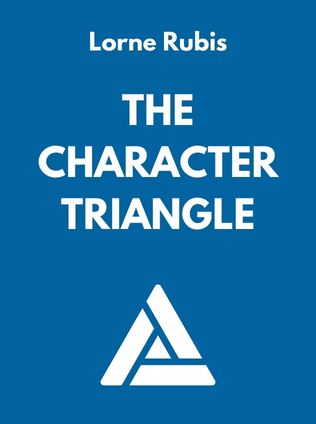
The Character Triangle
Build Character, Have an Impact, and Inspire Others
By Lorne Rubis
Published 10/2011
About the Author
Lorne Rubis, the author of The Character Triangle: Build Character, Have an Impact, and Inspire Others, is a seasoned business leader and CEO with a diverse career path that began as a schoolteacher and coach. He has spent significant time driving organizational change and performance improvement as a general manager, facilitator, and consultant. Rubis's book encapsulates his deep understanding of leadership and personal development, derived from both his professional journey and personal experiences.
Main Idea
The central theme of The Character Triangle revolves around the integration of three core values—accountability, respect, and abundance—into our daily lives. Rubis argues that these values, when consistently applied, form a habit system that significantly enhances personal and professional success. The Character Triangle is a framework designed to help individuals build character, make a positive impact, and inspire others.
Table of Contents
- Introduction to the Triangle
- Be Accountable
- Be Respectful
- Be Abundant
- Building the Triangle
- Feedback in Today's Workplace
- Climbing to the Top of the Character Triangle
Introduction to the Triangle
The Character Triangle is a personal game changer that emphasizes the importance of building character to achieve success in all aspects of life. Rubis explains that our character is defined by our thoughts, actions, and choices. By adopting the values of accountability, respect, and abundance, we can develop a robust habit system that drives us towards success and fulfillment.
"Our character is exclusively ours. We define it by how we think, what we do, and the choices we make." – Lorne Rubis
Be Accountable
Accountability starts with self. Rubis emphasizes the importance of personal responsibility in every situation, rejecting the blame game and victim mentality. Self-accountability involves asking what we can do to improve a situation rather than blaming others. This proactive approach fosters a sense of ownership and drives positive change.
"When we first take personal accountability seriously, we each have to skillfully analyze and execute appropriate actions." – Lorne Rubis
Key steps to becoming more accountable include:
- Be honest and do it now: Recognize and accept when something is not right and take immediate action to address it.
- Be first: Focus on what you can do personally to effect change before expecting it from others.
- Do what you can do: Take personal action to improve processes and results, regardless of your position.
- Do not "beat yourself up": Avoid self-blame and instead focus on constructive self-improvement.
"Self-responsibility is a forward motion; blame takes us backward." – Lorne Rubis
Accountability is not just about owning up to mistakes but about being proactive in creating solutions. When something goes wrong, it's easy to blame external factors, but true accountability requires us to look inward first. This mindset shift from blame to personal responsibility can transform not only individual performance but also team dynamics.
- Instead of blaming market conditions for poor sales, a sales team could analyze their own strategies and find areas for improvement.
- When a project is delayed, team members should first consider what they could have done differently to stay on schedule before pointing fingers at others.
Be Respectful
Respect is foundational to building strong relationships and achieving success. Rubis highlights the need to treat ourselves and others with respect, starting with genuine openness and understanding. Respect is not something to be earned but rather something to be given unconditionally.
"To be true to the root of respect, one has to continuously look at one's self with openness and understanding." – Lorne Rubis
Key principles of respect include:
Sign up for FREE and get access to 1,400+ books summaries.
You May Also Like
The Subtle Art of Not Giving a F*ck
A Counterintuitive Approach to Living a Good Life
By Mark MansonRich Dad Poor Dad
What the Rich Teach Their Kids About Money - That the Poor and Middle Class Do Not!
By Robert T. KiyosakiHow To Win Friends and Influence People
The All-Time Classic Manual Of People Skills
By Dale CarnegieQuiet: The Power of Introverts
The Power of Introverts in a World That Can't Stop Talking
By Susan Cain



















